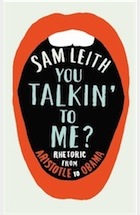I wrote this for The Scotsman last year but it never saw the light of day…until now!
Rhetoric: it’s a bit of a dry topic, isn’t it? Full of old men in togas droning on, Latin words you can barely wrap your tongue around and all manner of complicated rules? Not so in Sam Leith’s wonderfully witty and informative new book You Talkin’ To Me? Rhetoric from Aristotle to Obama.
In this book, Leith, a regular contributor to the Guardian, Evening Standard, Wall Street Journal and Spectator, sets out to prove that “this is not a subject that needs to be intimidating.” Ever wondered why you can never remember what page number you read something on but you can remember its location on the page? Leith’s musings on rhetoric and memory will enlighten you. Ever considered the phrase “pure rhetoric” to be an insult? Leith will change your mind on that matter. After reading this book, you will never again be able to listen to a politician’s speech without a knowing smile creeping over your face and thoughts like “what an obvious attempt at exordium” entering your head.
Rhetoric is, as Leith puts it, “the art of persuasion: the attempt by one human being to influence another in words. It is no more complicated than that.” It can be formal, used by the likes of priests and politicians to influence their audience, but it can also be as ordinary as a man chatting up a woman in a nightclub or someone trying to wriggle out of getting a parking-ticket. That’s what’s so refreshing about Leith’s book; he takes a topic often thought of as archaic, dusts it down, and brings it slap bang into the twenty-first century.
True, all the old familiars are here: Plato, Socrates, Aristotle, Cicero, Quintilian, but so are a wide and often surprising range of other famous figures, from Satan and Sarah Palin to JFK and Jennifer Lopez. The fact that George Galloway, Gandhi and Art Garfunkel (unusual bedfellows by anyone’s standards) lie together in the book’s index is an indication of how far-reaching and entertaining Leith’s examples of rhetoric are. When ancient figures are discussed – and they’re discussed throughout the book – the information imparted is genuinely enlightening.
The book has a sometimes scholarly feel – Leith certainly knows his onions – but whenever it risks becoming too “high-brow” Leith pulls it back down to earth by quoting a song from South Park or relating an amusing anecdote involving Piers Morgan’s doomed appearance on Have I Got News For You?, a programme which, interestingly, uses a rhetorical question for its title (you start to notice these things after reading the book). In this way, the drier, more complicated information is rendered accessible and sits more readily in the reader’s memory.
An example of this is when Leith tells us about “Judicial Rhetoric” – rhetoric that looks to the past in order to convict or exonerate – and uses a scene from the 1992 courtroom drama A Few Good Men to illustrate his point. By describing an exchange between Tom Cruise’s character Daniel Kaffee and Jack Nicholson’s Colonel Jessep, Leith is able to use heady terms such as “conjectural stasis”, “qualitative and/or translative stasis”, “ethos appeal” and “pronominal movement” and actually make sense of them.
The tone is winningly direct but full of amusing flourishes, such as when Leith refers to the time when rhetoric becomes lofty as “when rhetoric puts on a dinner jacket and polishes its dancing shoes”, or describes a drunk girl as having had “a baker’s dozen of Bacardi Breezers”.
The book is happily organised into bite-size chunks, making the often weighty topics more digestible. Some of the content is unavoidably dense – I’m still trying to wrap my tongue (and head) around words such as “anadiplosis” and “occultation” – but there’s a handy glossary at the back of the book for when things get a bit tricky.
From the origins of rhetoric in the far-off climes of Ancient Greece to the rhetorical tricks used by the likes of David Cameron today, Leith’s book covers vast ground and gives an excellent overview of a topic that is, as it turns out, extremely interesting and, as Leith puts it, “gathers in the folds of its robes everything that makes us human”. Who knew?




